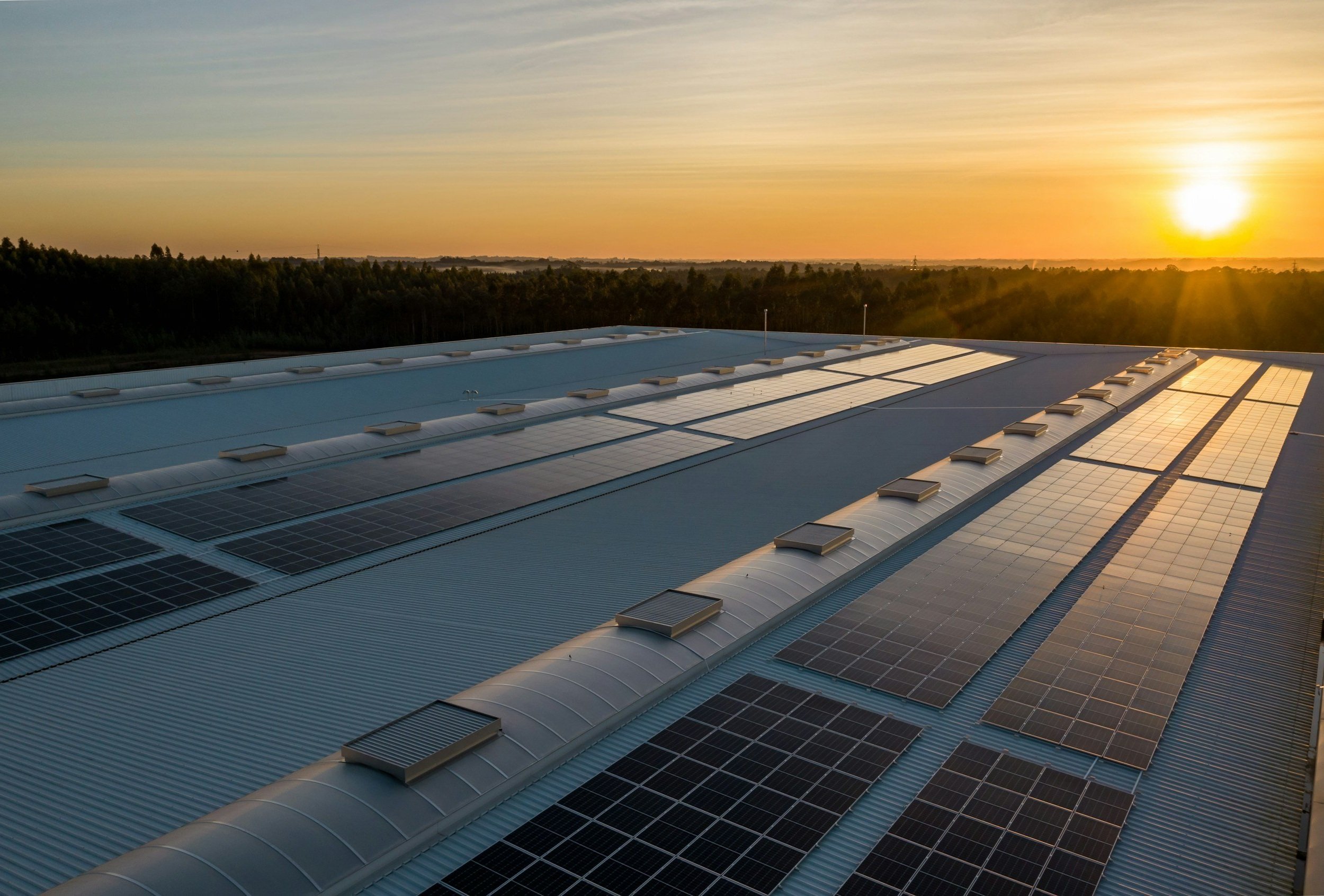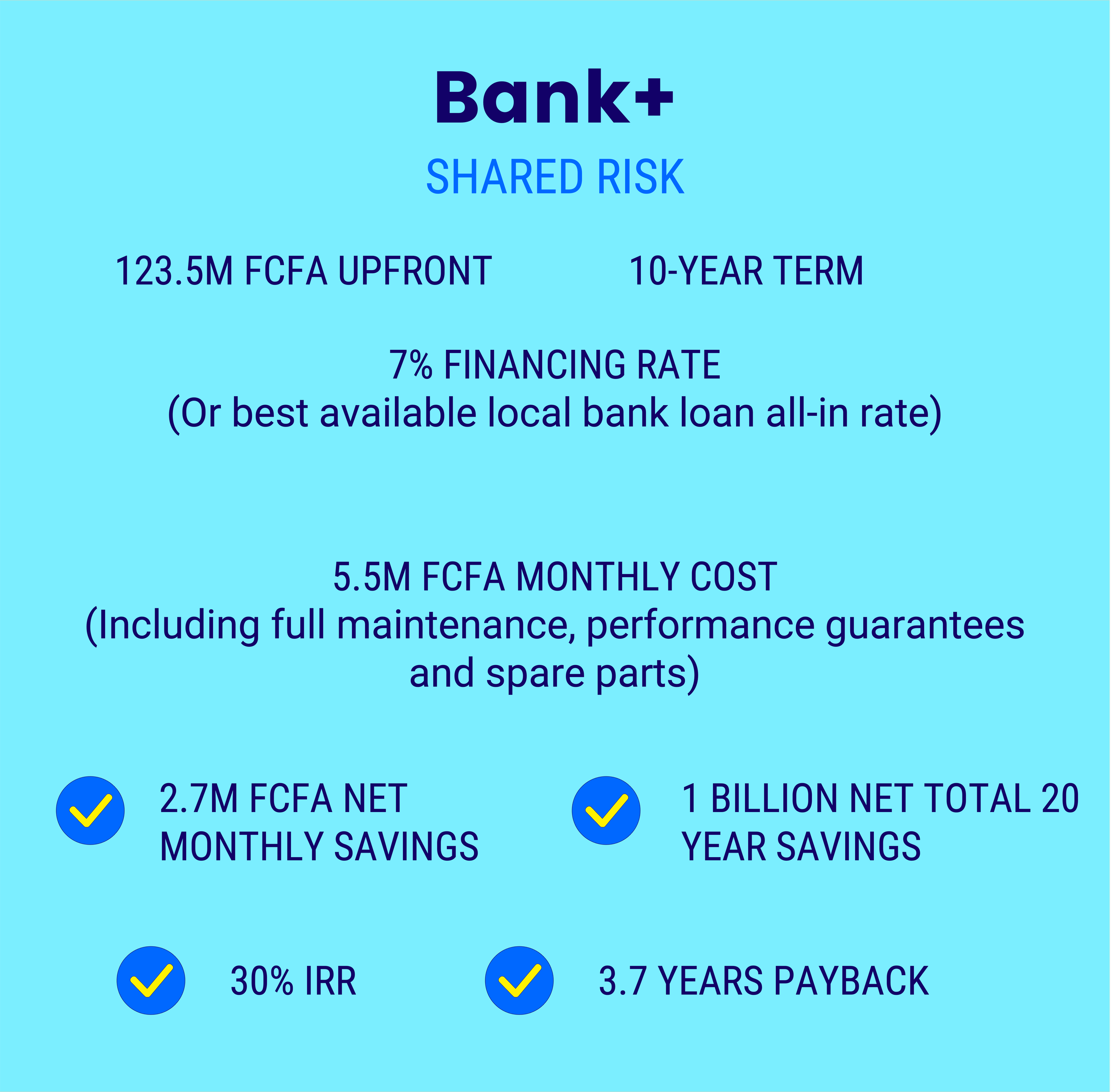
kalao in action

Example of a project for an agro-processing plant in Cotonou

In this section, we detail how kalao sizes its projects to bring the benefits of solar energy to its customers, through an example for an industrial customer.
1. Estimating the need
The first thing to do when defining a solar project is to precisely define the customer's energy needs.
In our example, the plant's monthly electricity bill amounts to 30 million FCFA, for a consumption of almost 237,000 kWh at the Medium Voltage Hourly rate.
The plant also uses a generator in the event of a power cut, and spends around 5 million FCFA a month on fuel.
The plant operates 24 hours a day, with very stable consumption due to its production processes. The plant runs every day except Sundays, when the regime is consequently very reduced.
This information allows us to reconstruct the plant's energy profile and load curve.
To obtain a more accurate curve, it is possible to install load analyzers and collect data over several weeks.
2. Finding the optimal system
Based on the energy profile obtained in step 1, kalao runs its optimization algorithms to determine the ideal characteristics of the solar systeme — i.e. the system that maximizes the customer's savings. The calculation takes many parameters into account, such as the exact location of the future system, the solar irradiation received and seasonal variations, the surface area available to install the photovoltaic panels, the site configuration, etc.
In our example, the optimum size is 1 megawatt-peak (MWp). The system is hybrid: this means it will operate in harmony with the other sources of electricity used by the plant. Solar power will be injected in priority when it is available, and the system will mix it with electricity from the grid or the generator in real time to meet the factory’s demand. In this way, the plant's energy supply will remain as stable as before, even in the event of rain or cloudy weather.
On average, solar power will provide 35% of the electricity consumed. For the time being, the energy produced on Sundays will essentially not be consumed. If the plant were to operate at full capacity on Sundays, or if it were possible to feed the solar surplus back into the electricity grid, the system's profitability would be further enhanced.
3. Choising between kalao’s plans
Once the optimum system configuration has been determined, the customer can choose between kalao’s three plans: Gold, Bank+ and Direct Purchase.
The Gold plan allows the customer to take the least risk by accessing solar energy for a very low initial commitment. The contract can then be extended for up to 15 years, during which the monthly payments cover all the costs associated with the solar installation, with the guarantee that everything will continue to work for the duration of the project.
The Bank+ plan, on the other hand, mimics what the customer could obtain by going to a traditional bank to finance their solar system, but with reduced risk, as kalao remains responsible for the proper functioning of the system and all its guarantees continue to apply, in the same way as with the Gold offer.
Finally, the Direct Purchase plan enables customers to finance their system themselves. They retain the certainty that their system is sized to their exact requirements, and designed to last, with quality equipment. kalao can carry out maintenance and guarantee the system's performance if the customer so wishes.
kalao provides its customers with a financial model so that they can compare different plans in detail.



kalao most often recommends the Gold Plan, which allows customers to take minimal risk and offers extremely attractive performance.
Zoom on the Gold Plan
81 FCFA/kWh
The solar system installed by kalao will produce electricity at a much lower rate than the grid (102 on average) or generators (>190).
1.1 MILLION
of net mensual savings from the first month on
<4 MONTHS
to pay back the client’s initial capital commitment thanks to savings on solar energy
645 MILLION
net savings over 20 years
4. Operation of the solar plant
With Gold and Bank+ plans, kalao remains responsible for the solar system's performance and remains in charge of maintenance, including spare parts.
In the event of non-payment of monthly installments, kalao can simply shut down the system until the issue is resolved. If no solution is founds, kalao simply takes back the equipment.
Once the system has been fully reimbursed, kalao can remain in charge of maintenance, but the customer is free to entrust it to another partner or to take it in-house.
Your project with kalao: simpler, more profitable, less risky
| With kalao | Without kalao | |
|---|---|---|
| Simplicity | All-in-one contract |
|
| Quality | Incentive and expertise to use most performant equipment | Tendency to prioritize price over quality |
| Financing |
|
|
| Permitting | Guided support through the regulatory approval process | Limited to no support |
| O&M |
|
|
| Spare parts | Included | Normally not included |
| Risk | Minimum risk | Maximum risk |
Discover kalao's plans, tailor-made for your business!
How does kalao manage to provide such great deals?
kalao’s plans, in particular the Gold and Bank+ offers, are so attractive to our customers that some wonder if it's too good to be true.
How can kalao make money by offering such profitable, low-risk projects to its clients?
The answer is simple: we've been solar energy experts for over a decade. We know what many people still don't know (but won't for long): solar power is a revolution!
We know that solar power works, even for the most demanding customers and the most energy-hungry industrial machines. We know that solar energy is already cheaper than all other energies. We have the expertise to develop complex projects by bringing together specialized technical partners to create sustainable, high-performance systems that are perfectly aligned with our clients' needs.
That's why we're ready to take the solar risk for our customers, allowing them to benefit from all its advantages with a simple, all-in-one, tailor-made solution.
We also firmly believe in the potential of the private sector in Africa. We've ourselves been entrepreneurs in the region for over a decade, and are ready to bet on our customers' success, invest alongside them and actively contribute to the continent's energy transition.
kalao takes a cut on financing and operating costs, while ensuring that our projects stand as high-performing investments for our clients.
FAQFrequently Asked Questions
-
High-quality solar panels are guaranteed for 20 or even 25 years. Their lifespan can easily exceed 30 years: the end of the warranty period does not mean that the panels stop producing electricity; their efficiency simply decreases slightly over time.
-
Absolutely. With the right system size and configuration, solar energy can power everything from basic appliances to heavy industrial machinery. We assess your energy needs and design a system that ensures you have the necessary power.
-
Solar panels can still produce energy on cloudy days, but at a reduced rate. kalao's sizing methodology takes into account the variability of sunshine throughout the year. In some cases, a battery bank can be integrated into your solar system to store excess energy on sunny days for use during less sunny periods.
-
While savings vary, businesses can typically offset their financing costs through the reduction in their monthly energy bills. We offer a free consultation to provide a more tailored estimate.
-
Offers with integrated financing are reserved for projects of 50 kW or more. Generally, these systems are suited for businesses with monthly energy bills of 1 million FCFA or more. Our financial partners must then ensure the robustness of our clients by analyzing their balance sheets, the structure of the company, and the history of their energy bills before approving the signing of a contract.
-
All solar systems above 10 kW must be submitted to the Benin Electricity Regulatory Authority for approval.












